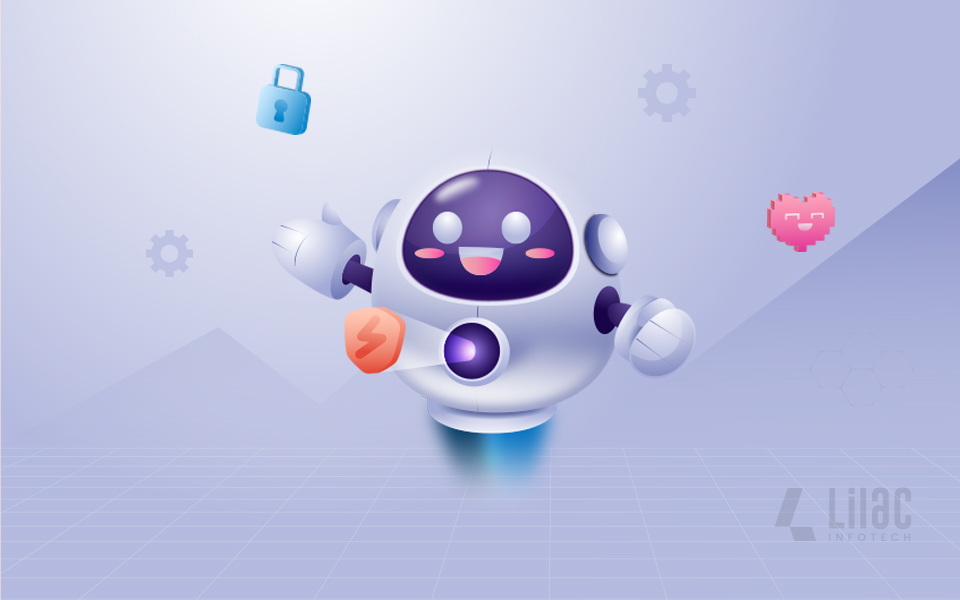
“Artificial intelligence is a branch of computer science dealing with the simulation of intelligent behavior in computers.” -John McCarthy
Artificial intelligence has evolved into a formidable tool in recent years, allowing machines to think and act like humans. Furthermore, it has piqued the interest of IT organizations all over the world and is regarded as the next significant technology revolution following the rise of mobile and cloud platforms. Some have even referred to it as the "fourth industrial revolution."
The future of AI appears to be a swiftly changing landscape since current breakthroughs in the field of artificial intelligence are advancing at such a breakneck pace that it's difficult to stay up. Indeed, artificial intelligence is affecting humanity's destiny in practically every industry. It is already the primary driver of developing technologies such as big data, robots, and IoT, not to mention generative AI, with tools such as ChatGPT and AI art generators gaining public attention, and it will remain a technical innovator for the foreseeable future.
It seems like AI will modernize the world at large. But identically how?
Evolution of AI
Artificial intelligence (AI) has evolved dramatically over the years, from a concept to a strong and omnipresent technology. AI was first centered on rule-based systems and expert systems, where explicit rules were designed to replicate human intelligence. These devices were restricted in functionality and required substantial human programming.
However, with the introduction of machine learning and huge data, AI advanced significantly. AI systems can now learn from massive volumes of data and improve their performance over time through machine learning techniques. This transition ushered in a new era of artificial intelligence, in which models could recognize patterns, make predictions, and solve complicated problems with unprecedented precision. The incorporation of AI technology into common gadgets and systems is another critical component of AI evolution. Smartphones, smart home devices, virtual assistants, and self-driving cars are just a few examples of AI-powered technologies that have become commonplace in our lives. AI has also advanced significantly in robotics, allowing robots to do complex jobs, communicate with humans, and function in dynamic contexts. AI algorithms are currently used by businesses to extract important insights from vast datasets, optimize processes, and personalize customer experiences. The future of AI presents a plethora of possibilities, with projected advances in disciplines such as explainable AI, reinforcement learning, and quantum computing. These advancements are likely to greatly improve AI systems' capabilities and effectiveness. AI can disrupt sectors and revolutionize the way people live, work, and interact with technology through continual study and development. AI may open new frontiers and unleash untapped potential by leveraging the power of these emerging technologies, paving the way for a future in which intelligent systems play an important role in creating our society.
In this essay, we will learn about how AI is evolving daily life and different industries.
AI in Different Industries
Artificial intelligence (AI) has emerged as a transformational technology in a variety of industries, revolutionizing company operations and opening up new avenues for growth and innovation. AI is being used in industries such as healthcare, banking, manufacturing, transportation, and retail to automate operations, decision-making, and efficiency, and provide personalized experiences. AI systems enable organizations to unlock new levels of productivity, optimize operations, and gain a competitive edge in today's quickly expanding digital economy by analyzing massive volumes of data, learning from patterns, and making intelligent predictions. AI is transforming industries and driving the next wave of technological innovation with its vast variety of web applications.
- Healthcare
Beyond robotic surgery arms, artificial intelligence (AI) has indeed revolutionized healthcare in a variety of ways. Cambio Wellbeing Care, Coala, and Aifloo are among the web development companies that are utilizing artificial intelligence to create new applications that track individuals' physical and mental well-being.
These technologies aid in the diagnosis of symptoms associated with cardiac illnesses, strokes, and other health conditions. AI-powered devices can also monitor patients in nursing homes and hospices to ensure their safety and well-being.
The COVID-19 pandemic demonstrated the significance of AI in disease diagnosis. Special computer programs that use picture recognition techniques have been used to aid healthcare workers in disease diagnosis. These programs can analyze medical pictures like X-rays and CT scans and provide useful information to healthcare providers.
This technology allows for remote diagnosis, allowing people to obtain information about their health problems even if they are a long distance away from a doctor. It also assists clinicians in selecting proper treatment options based on AI system analysis.
Furthermore, there are applications like the one launched by Babylon Health that utilize AI to act as virtual doctors. These apps use natural language processing algorithms to interact with users, asking them about their symptoms and providing instant, free consultations on what actions should be taken. These AI-powered tools can offer preliminary assessments, recommend self-care measures, and suggest when medical attention is necessary. They provide accessible and convenient healthcare options, especially in situations where immediate access to a physical doctor may be challenging. The advancements in AI technology have the potential to improve healthcare access, efficiency, and patient outcomes, ultimately transforming the way healthcare is delivered.
- Automotive
Technological advancements have played a critical part in the growth of self-driving cars. Self-driving vehicles, outfitted with advanced artificial intelligence and sensor technology, are no longer the stuff of science fiction but are quickly becoming a reality. According to studies, nearly 33 million self-driving cars will be on the road by 2040, indicating the broad use and acceptance of autonomous vehicles. These vehicles can see their environment, make real-time judgments, and navigate safely through traffic thanks to sophisticated autonomous systems powered by computer vision, machine learning, and sensor fusion. Continuous advancements in these technologies improve the performance and dependability of self-driving vehicles.
The advantages of self-driving cars are substantial. They have the potential to improve road safety by removing human error as a key source of accidents. Autonomous vehicles can react to changing road conditions faster and more accurately, lowering the danger of collisions. They can also optimize traffic flow, resulting in less congestion and quicker travel times. Furthermore, self-driving cars can improve accessibility and mobility for people who are elderly, crippled, or unable to drive, giving them fresh independence and convenience.
The future of self-driving cars is rapidly approaching, with increasing investments and collaborations among technology companies, automakers, and governments. As self-driving vehicles become more prevalent, it is crucial to understand their capabilities, limitations, and societal implications. This understanding will enable us to shape a future where autonomous transportation is seamlessly integrated into our everyday lives. With increased investments and collaborations among technology companies, automakers, and governments, the future of self-driving cars is swiftly approaching. As self-driving cars grow increasingly common, it is critical to understand their capabilities, limitations, and societal consequences. This knowledge will allow us to build a future in which autonomous mobility is smoothly incorporated into our daily lives.
Unlock the potential of AI for your web development needs.
Let's revolutionize your online presence with the power of artificial intelligence
- Retail and E-commerce
In the Retail and e-commerce industries, artificial intelligence (AI) is playing a critical role in improving consumer experiences, optimizing operations, and boosting sales. AI is widely used in personalized marketing and recommendation systems. AI algorithms can give tailored product ideas and recommendations to specific shoppers by analyzing customer data and behavior trends. Retailers can now give a more personalized and bespoke purchasing experience, enhancing consumer engagement and driving conversions.
Chatbots are becoming more common in customer service. Natural language processing and machine learning techniques are used by these virtual assistants to understand consumer inquiries and offer automatic responses. Chatbots may answer typical client questions, provide product information, track orders, and even provide personalized recommendations. They provide organizations with around-the-clock support, faster response times, and cost savings.
Another area where AI is having a huge impact in retail and e-commerce is computer vision technology. It enables cashier-less checkout systems, in which AI algorithms analyze camera feeds and sensor data to automatically detect and bill customers for the things they have purchased, removing the need for traditional checkout lines. This technology simplifies the shopping experience, minimizes wait times, and increases customer convenience.
Overall,Artificial Intelligence (AI) is revolutionizing the retail and e-commerce industries by creating personalized experiences, enhancing customer service, enabling cashier-less checkout, and optimizing inventory management. As AI technology advances, retailers are discovering new ways to use it to stay competitive, improve consumer satisfaction, and drive corporate growth.

Wrapping Up
Artificial intelligence (AI) has enormous promise for altering industries and revolutionizing everyday lives in the future. AI technology breakthroughs are having an impact on a wide range of industries, from healthcare and e-commerce to retail and transportation. AI is increasing efficiency, improving decision-making processes, and accelerating innovation.
Collaboration between AI and web development firms will influence the future, allowing businesses to fully realize the potential of artificial intelligence and revolutionize everyday life.
Businesses can navigate the complex landscape of AI by leveraging the expertise of web development companies, propelling themselves towards a future where AI-driven solutions are seamlessly integrated into their operations, resulting in increased productivity, efficiency, and customer satisfaction. However, leveraging AI's power requires web development companies' expertise. These companies are crucial in developing and delivering AI-powered solutions that target specific industry needs. They help to create new applications that leverage AI algorithms, machine learning models, and data analysis methodologies to offer personalized experiences, optimize processes, and boost customer delight.
Post a Comment
Recent Comments
Thank you for this insightful article! It's incredible to see how AI is shaping our world for the better. The potential for transforming industries and enhancing everyday life is truly inspiring. I'm excited to see what the future holds as we continue to harness the power of artificial intelligence to drive innovation and positive change. Keep up the great work in sharing such valuable insights! https://bit.ly/49hGVR3



















Artificial Intelligence is not just a <a href="https://amrtechinsights.com/"> technological evolution </a>—it’s a driving force reshaping industries and daily life. In the future, AI will continue to automate complex tasks, enable smarter decision-making, and personalize experiences across sectors like healthcare, education, finance, and transportation. In everyday life, AI will make homes smarter, services more efficient, and interactions more human-like through voice assistants, smart devices, and predictive technologies. As AI becomes more integrated, it will enhance both business innovation and personal convenience, leading us toward a more connected and intelligent world.